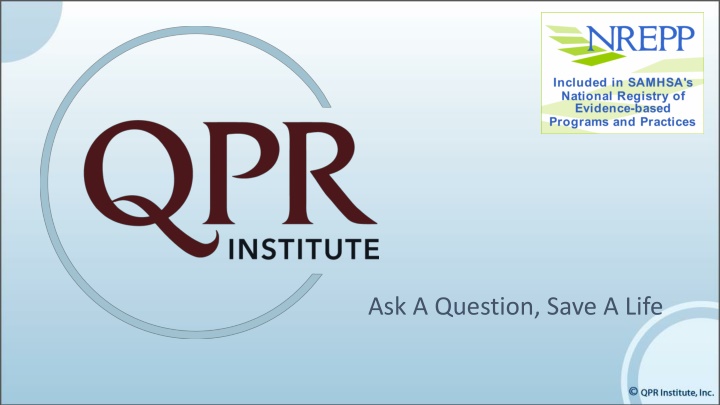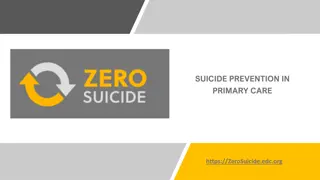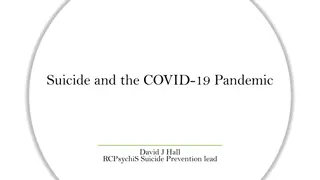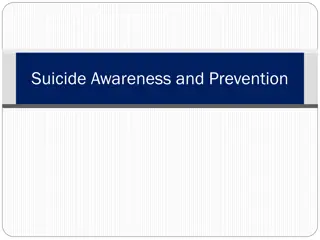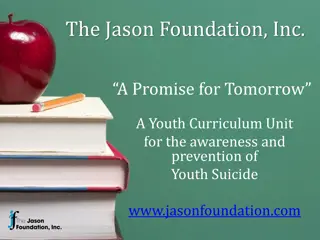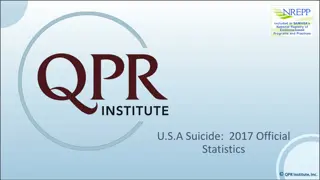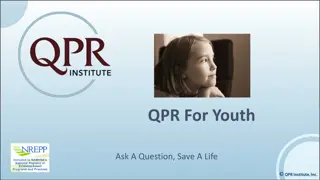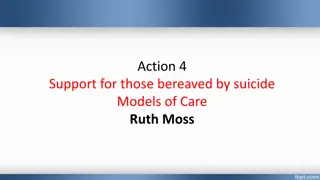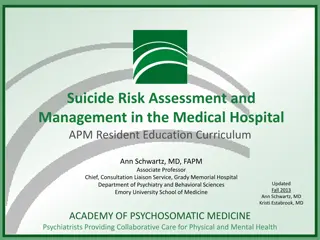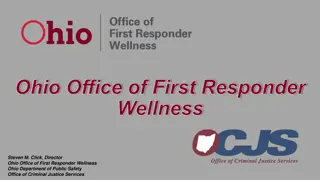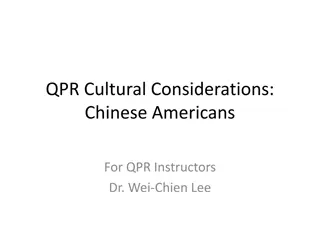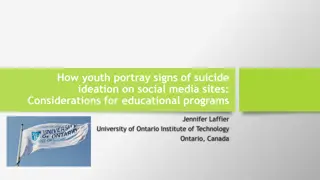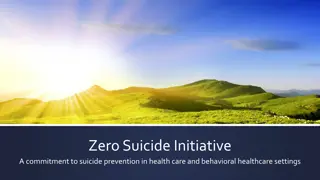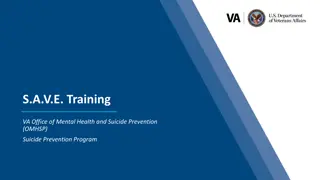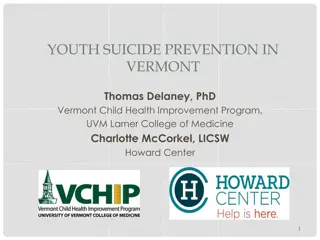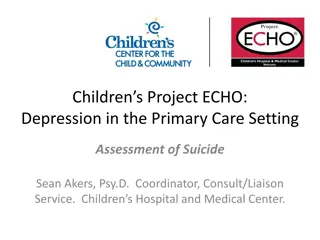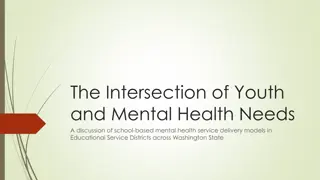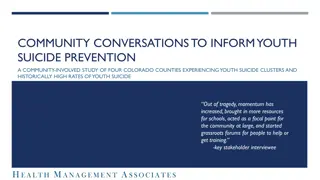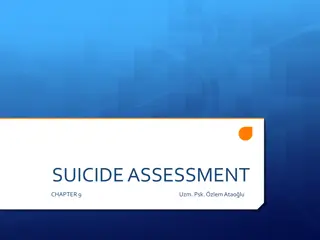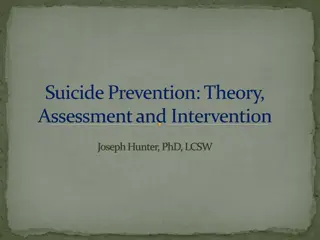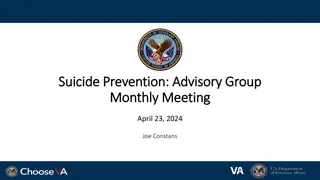QPR Training and Police Suicide Awareness
QPR training focuses on suicide prevention for law enforcement and emergency service professionals. The training aims to equip individuals with the skills and knowledge to recognize and intervene in suicide risk situations effectively. It sheds light on the alarming statistics of police suicides, emphasizing the importance of mental health awareness and support within these professions.
Download Presentation

Please find below an Image/Link to download the presentation.
The content on the website is provided AS IS for your information and personal use only. It may not be sold, licensed, or shared on other websites without obtaining consent from the author.If you encounter any issues during the download, it is possible that the publisher has removed the file from their server.
You are allowed to download the files provided on this website for personal or commercial use, subject to the condition that they are used lawfully. All files are the property of their respective owners.
The content on the website is provided AS IS for your information and personal use only. It may not be sold, licensed, or shared on other websites without obtaining consent from the author.
E N D
Presentation Transcript
QPR for Law Enforcement and Emergency Service Professional QPR Instructor Name
Goals Describe QPR and why everyone needs to know how to do it Provide an overview of suicide in America and in law enforcement Learn QPR Practice QPR Demonstrate knowledge and skill
Welcome to QPR training If you are going to have a heart attack in a public place, and not in front of a hospital emergency department, in what city or county do want to be in? Why we re here today
Why QPR for Emergency Services Professionals? Exposure to trauma increases risk Trauma exposure includes personal assault, murder, suicide and death investigations Familiarity with death reduces our fear of it More police officers die by suicide than are killed by felons or line of duty accidents
Police Suicide By the Numbers Data from 2018 159 Number of officer suicides in 2018 41 Average age of police suicide 15 years Average time on the job of a police suicide victim 151 Suicides by male officers 8 Suicides by female officers More officers died by suicide than were killed in the line of duty. The single greatest cause of death for law enforcement officers each year is suicide, Jeff McGill, co-founder of BlueH.E.L.P.
Why now? National Suicide Prevention Strategy Advances in effective treatments Military experience (US Air Force story) Suicide survivor movement Federal and state leadership International Association of Chiefs of Police and Sheriffs leadership
Risk windows Suicide risk increase with Alcohol use Untreated depression Using alcohol with depressed PTSD Overwhelming stress from death of a child or spouse, divorce, terminal illness, responsible for co-worker death, killed someone out of anger, indictment, isolation, accusations of sexual misconduct, conviction of crime, being locked up or threatened by any of the above.
Times are changing Suicide is now preventable Everyone is responsible to take action to prevent a death, including by suicide Suicidal thinking and planning often precede not only violence to self but others. Thus, preventing suicide prevents other forms of violence.
QPR Question, Persuade, Refer
QPR QPR is not intended to be a form of counseling or treatment. QPR is intended to offer hope through positive action.
Suicide Myths and Facts Myth Fact never be suicidal again. Myth Confronting a person about suicide will only make them angry and increase the risk of suicide. Fact Asking someone directly about suicidal intent lowers anxiety, opens up communication and lowers the risk of an impulsive act. Myth Only experts can prevent suicide. Fact Suicide prevention is everybody s business, and prevent the tragedy of suicide No one can stop a suicide, it is inevitable. If people in a crisis get the help they need, they will probably anyone can help
Suicide Myths and Facts Myth Fact week preceding their attempt. Myth Those who talk about suicide don t do it. Fact People who talk about suicide may try, or even complete, an act of self- destruction.. Myth Once a person decides to complete suicide, there is nothing anyone can do to stop them. Fact Suicide is the most preventable kind of death, and almost any action may save a life. Suicidal people keep their plans to themselves. Most suicidal people communicate their intent sometime during the positive How can I help? Ask the Question
Suicide Clues And Warning Signs The more clues and signs observed, the greater the risk. Take all signs seriously.
Direct Verbal Clues: I ve decided to kill myself. I wish I were dead. I m going to commit suicide. I m going to end it all. If (such and such) doesn t happen, I ll kill myself.
Indirect Verbal Clues I m tired of life, I just can t go on. My family would be better off without me. Who cares if I m dead anyway. I just want out. I won t be around much longer. Pretty soon you won t have to worry about me.
Behavioral Clues: Any previous suicide attempt Acquiring a gun or stockpiling pills Co-occurring depression, moodiness, hopelessness Putting personal affairs in order Giving away prized possessions Sudden interest or disinterest in religion Drug or alcohol abuse, or relapse after a period of recovery Unexplained anger, aggression and irritability
Situational Clues: Being fired or being expelled from school A recent unwanted move Loss of any major relationship Death of a spouse, child, or best friend, especially if by suicide Diagnosis of a serious or terminal illness Sudden unexpected loss of freedom/fear of punishment Anticipated loss of financial security Loss of a cherished therapist, counselor or teacher Fear of becoming a burden to others
Tips for Asking the Suicide Question If in doubt, don t wait, ask the question If the person is reluctant, be persistent Talk to the person alone in a private setting Allow the person to talk freely Give yourself plenty of time Have your resources handy; QPR Card, phone numbers, counselor s name and any other information that might help Remember: How you ask the question is less important than that you ask it
QQuestion Less Direct Approach: Have you been unhappy lately? Have you been very unhappy lately? Have you been so very unhappy lately that you ve been thinking about ending your life? Do you ever wish you could go to sleep and never wake up?
QQuestion Direct Approach: You know, when people are as upset as you seem to be, they sometimes wish they were dead. I m wondering if you re feeling that way, too? You look pretty miserable, I wonder if you re thinking about suicide? Are you thinking about killing yourself? NOTE: If you cannot ask the question, find someone who can.
QQuestion How NOT to ask the suicide question: You re not thinking of killing yourself, are you? You wouldn t do anything stupid would you? Suicide is a dumb idea. Surely you re not thinking about suicide?
PPersuade How to Persuade someone to stay alive Listen to the problem and give them your full attention Remember, suicide is not the problem, only the solution to a perceived insoluble problem Do not rush to judgment Offer hope in any form
PPersuade Then Ask: Will you go with me to get help? Will you let me help you get help? Will you promise me not to kill yourself until we ve found some help? YOUR WILLINGNESS TO LISTEN AND TO HELP CAN REKINDLE HOPE, AND MAKE ALL THE DIFFERENCE.
RRefer Suicidal people often believe they cannot be helped, so you may have to do more. The best referral involves taking the person directly to someone who can help. The next best referral is getting a commitment from them to accept help, then making the arrangements to get that help. The third best referral is to give referral information and try to get a good faith commitment not to complete or attempt suicide. Any willingness to accept help at some time, even if in the future, is a good outcome.
Remember Since almost all efforts to persuade someone to live instead of attempt suicide will be met with agreement and relief, don t hesitate to get involved or take the lead.
For Effective QPR Say: I want you to live, or I m on your side...we ll get through this. Get Others Involved. Ask the person who else might help. Family? Friends? Brothers? Sisters? Pastors? Priest? Rabbi? Bishop? Physician?
For Effective QPR Join a Team. Offer to work with clergy, therapists, psychiatrists or whomever is going to provide the counseling or treatment. Follow up with a visit, a phone call or a card, and in whatever way feels comfortable to you, let the person know you care about what happens to them. Caring may save a life.
REMEMBER WHEN YOU APPLY QPR, YOU PLANT THE SEEDS OF HOPE. HOPE HELPS PREVENT SUICIDE.
The lethal triad: Act now! ! UPSET PERSON FIREARM ALCOHOL When these 3 are present the risk of violence is high. Reduce any or all of them immediately and lives can be saved.
Lets practice this skill 1. Choose a partner 2. Identify who will portray person in crisis and who will portray Gatekeeper 3. Person in Crisis: You will be talking with someone you already know from your work 4. Gatekeepers: Listen to the problem, find out what s going on and then ask the question.
QPR Ask A Question Save A Life! YOU can make the difference!
Thank you! Free book and newsletter Contact information: Instructor s phone: XXX-XXX-XXXX Institute phone: 1-888-726-7926 Email: qinstitute@qwestoffice.net Website: www.qprinstitute.com
